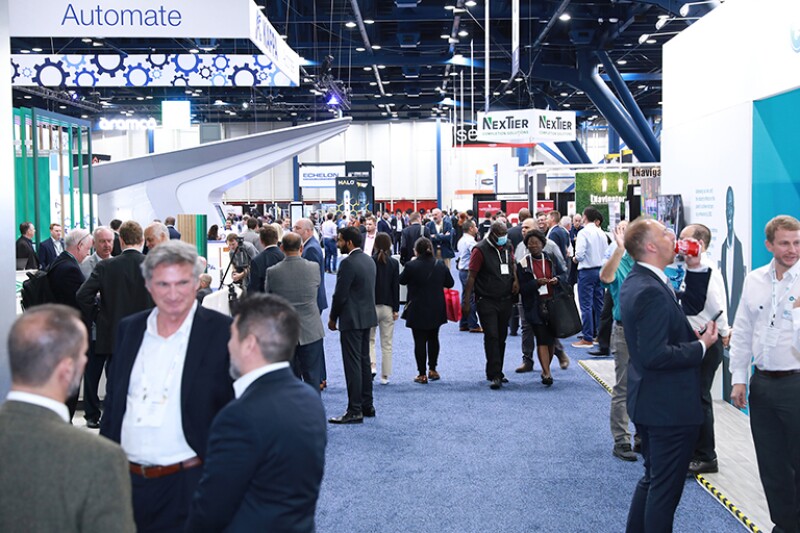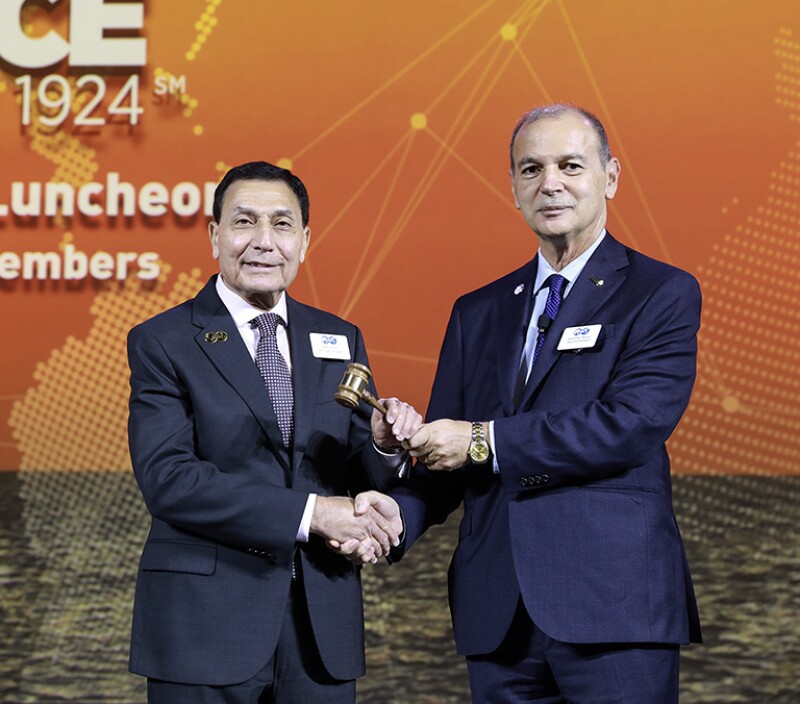For the first time since the 2018 SPE Annual Technical Conference and Exhibition (ATCE), the flagship technical conference was held in-person in the US. The COVID-19 pandemic forced us to meet virtually in 2020, and in 2021 we met in Dubai. It was exciting to start meeting our fellow SPE members in‑person again. We had a successful ATCE with more than 5,500 members from 58 countries participating. The conference included the traditional technical program (the backbone of SPE meetings) and panel discussions that were highlighted by the opening general session where senior executives from operating oil and gas companies, service companies, and consulting firms shared their views about how to transform the industry for the future in a sustainable manner anchored by our traditional petroleum engineering activities.
Additional sessions included a special panel discussion designed to listen to the members’ ideas regarding the SPE Strategic Plan, which I will discuss later in this column. Along with the extensive technical program, the main feature of ATCE that included more than 400 peer-selected papers from more than 1,200 abstracts submitted to the program committee, ATCE featured expansive exhibits where more than 220 companies showed their services and products to the attending members.

On the evening of the first day of the conference, alumni from various universities gathered at receptions to renew and start new friendships and discuss the future developments needed in petroleum engineering education at their universities. On Tuesday night, the Annual Reception and Awards Banquet honored members by presenting awards acknowledging the excellent contributions they made to our profession and in serving the members of the Society. On the last day of the conference, the President’s Luncheon and Annual Meeting of the Members was held where 2022 President Kamal Ben-Naceur discussed the state of the Society and passed the gavel to me to start the new year of SPE. Feedback from members attending the conference was positive, and preparation for next year’s ATCE, which will be held in San Antonio, Texas, from 16–18 October, is underway. The Call for Papers is officially open at the 2023 ATCE site.
In 2022, several events took place that required a pause to think about their effect on our Society. It is time to close the chapter on these events, recognizing the lessons learned from them, and move forward with the main activities of SPE to provide members with the technical and professional support that allows us to provide the world with the energy it needs—safely, reliably, and in an environmentally friendly and affordable manner.
The first event was the proposal for a merger between AAPG and SPE. As most of our members know, this merger did not materialize. The process for this measure started in 2021 when AAPG approached SPE to propose a merger and the SPE Board of Directors agreed to form joint committees with AAPG to study the potential advantages and drawbacks of a merger. The committees also investigated the different actions that would need to happen in various areas like governance, publications, and events to successfully combine the activities of the two organizations if a merger were achieved. These committees developed recommendations that were presented to the AAPG Executive Committee and the SPE Board of Directors. The SPE Board was scheduled to meet in March 2022 to make a final decision whether to approve presenting the proposed merger for a vote by our membership. According to the bylaws of SPE, for such a merger to occur, two-thirds of the voting members must approve it. However, before the SPE Board was set to meet, the AAPG Executive Committee voted not to proceed with the merger; therefore, there was no need for the SPE Board to continue considering the proposal.
Several lessons were learned from that experience. Probably the most important one is the importance of effective communications when significant changes in SPE are contemplated. Additionally, it serves us well that for any future measures or significant decisions, extensive communication be presented to our members along with adequate opportunities to express opinions and provide feedback so that all members have the opportunity to share their views.
The second event that happened in 2022 was the successful petition to hold a member-wide election for three seats on the SPE Board of Directors. SPE bylaws call for a nominating committee that is responsible for evaluating the qualifications of nominees for open positions to replace Board members whose terms are expiring. Membership on the Board is for one 3-year term. The terms of the various directors are staggered such that we are replacing about one-third of the Board every year. Any member of SPE can be nominated to have a position on the Board, including the ability to self-nominate. After the nominating committee evaluates the qualifications of the various nominees, it makes a recommendation to the Board of Directors about the most-qualified candidates. Diversity of geographic regions, industry segments, and technical disciplines factor in the decisions of the nominating committee. After reviewing the recommendations and discussing them, the Board of Directors makes the final decision about the members who will be nominated. Names of the nominated candidates are published in JPT and on SPE.org, and members who decide to nominate other candidate(s) have the right to submit a petition to hold an election. That is what happened this year for three positions on the Board. Holding an election has rarely happened. The last time that occurred was in 1995. The procedures that govern the process were developed more than 60 years ago, back when the communications technology available to members was completely different than what it is today. Following the success of the petition to hold an election for the three positions on the Board, an election was held with approximately 15% of eligible SPE members taking part in the vote. Following the election, it is clear that the bylaws governing future elections need to be changed to reflect the current makeup of the Board, the current status of the distribution of our members based on geographic areas and technical disciplines, as well as communication methods available today. The Board is working on updating these bylaws and is seeking your comments on the proposed revisions. Once the update is finalized, the new proposed bylaws will be presented to all members so that they can provide feedback, ideas, and opinions about the changes. The Board will consider the members’ input and finalize the procedure that will be used from now on.

The third event that began last year was the development of the new Strategic Plan for SPE. The process of updating the plan is an ongoing exercise that takes place about every 5 years or so. The last time the plan was updated was in 2017, so this year is the year for a new plan to be developed. The process involved in developing the plan was described in a previous column by Kamal Ben-Naceur, our 2022 president, and in my interview that was published in the September issue of JPT. The main action needed from our members right now is to continue to provide input about the new Strategic Plan. A survey requesting this input has been available and its link published in JPT. This link is still open for members to login and provide their input, ideas, and thoughts about the future services and activities of the Society.
An additional method to gain member feedback taken by the executive leadership and the Board was to hold a panel discussion during ATCE, designed to listen to input from the members about their thoughts about the Strategic Plan. This was a successful discussion where a large number of members attended, fully participated, and provided valuable input. This session was recorded and you can watch it on SPE.org. The Board will finalize the plan considering all input by the end of this year. Positive feedback about this panel discussion was received from members and they recommended such a panel discussion be added to all future ATCE meetings.
The three specific events that I just described were things that don't regularly happen. However, since we have them now in our experience, we should consider the lessons learned. It is now time to focus on the main mission of the Society, which is (I am paraphrasing) to provide petroleum engineers with the technical and professional support to perform their work while having a fulfilling career that makes them look forward to proudly show up for their jobs every day so that we can provide the world with safe, reliable, environmentally friendly, and affordable energy for the foreseeable future.
Until next month!


